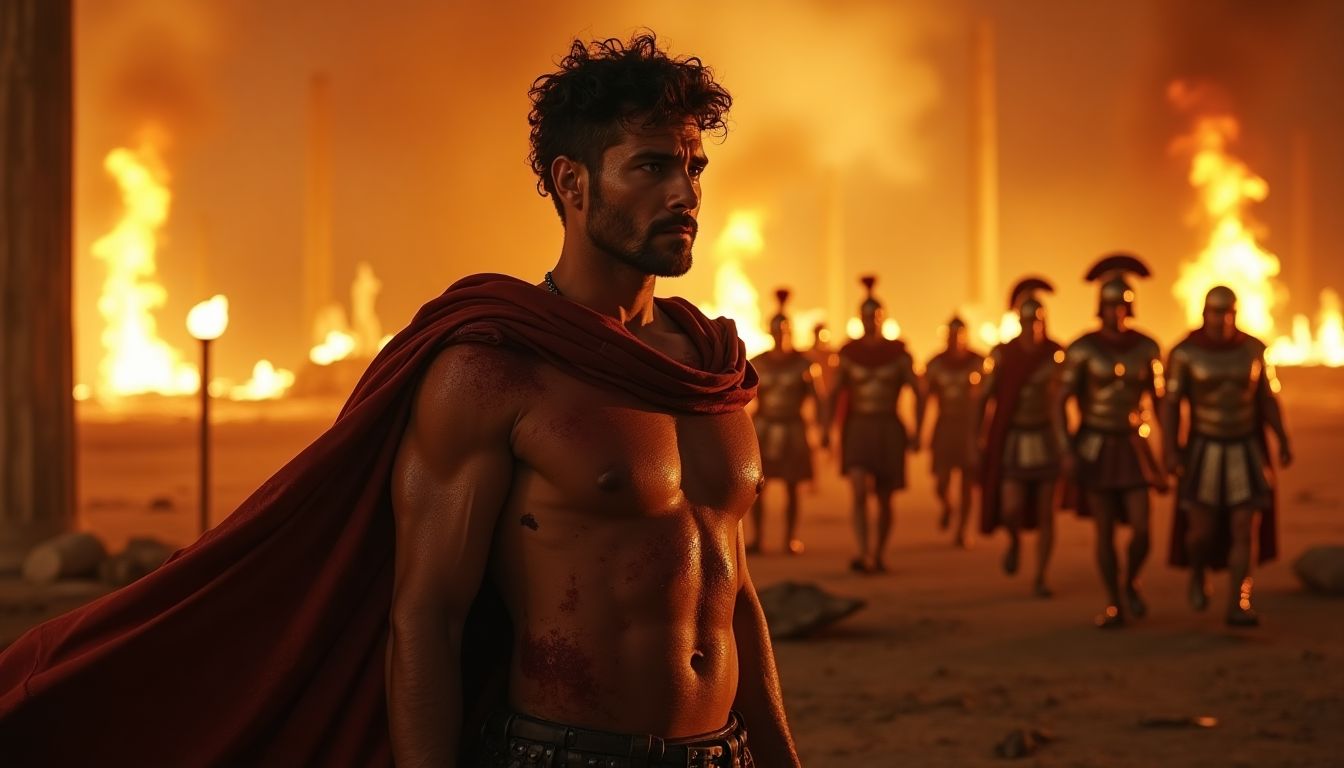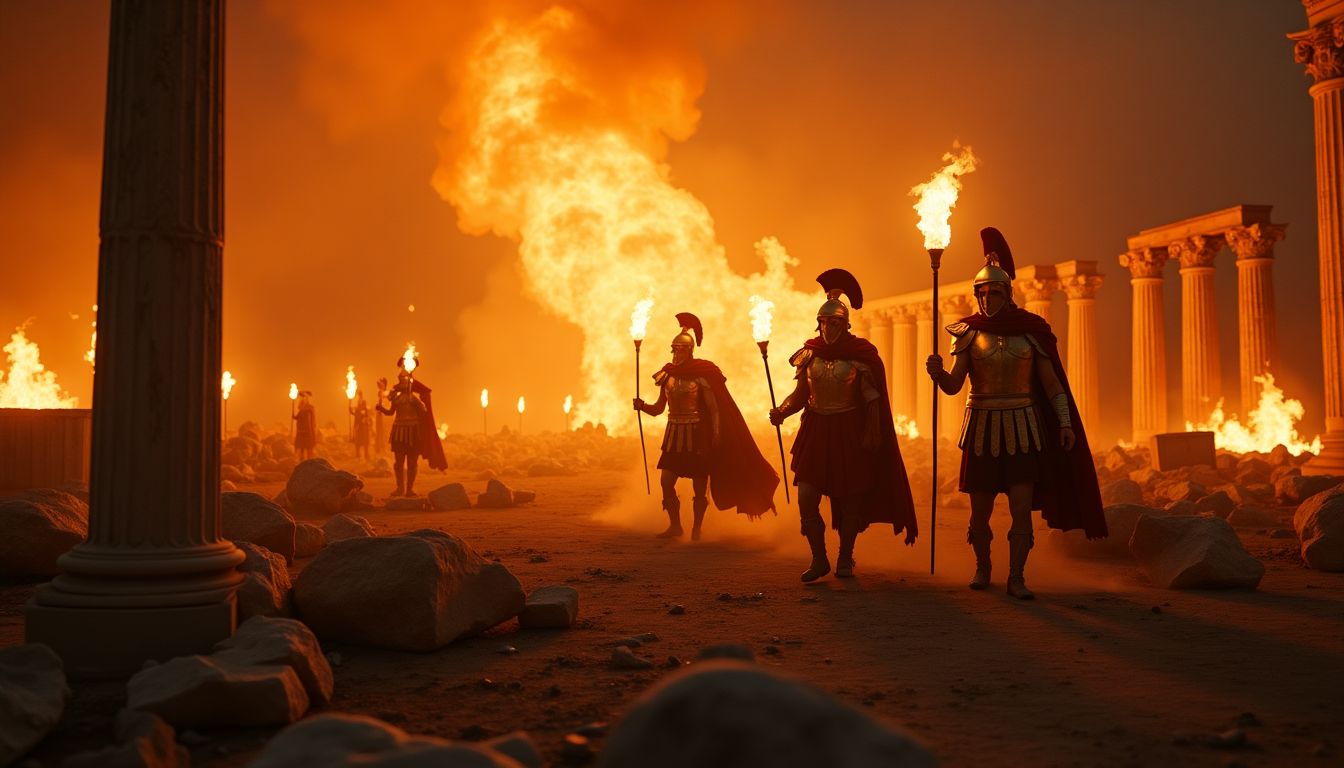The Betrayal of Fire
The days leading up to this nightmare had been deceptive with their eerie calm. Carthage had been prospering, or so it seemed: allies traded goods, and the Senate debated philosophies and grain tariffs. Yet the murmurs of war with Rome had grown louder. Aeneas, a former general turned soft by peace, had ignored them as the grumbles of fear-mongers.
Then came the betrayal. They had opened the city gates to an envoy bearing symbols of truce—olive branches and Roman promises sealed in wax. The Carthaginians, trusting in diplomacy, did not expect the legionnaires hidden in the folds of darkness. By the time they realized their error, it was too late. Fires and screams had become their morning herald.
The Roman consul, Varius, had a voice like a blade drawn slowly. “You were fools to think Carthage could ever stand against Rome,” he had said, standing atop a makeshift platform as the city's Senate knelt before him. They’d executed the elders one by one, while Varius forced the townsfolk to watch. Aeneas remembered gripping Polyxena’s trembling hand as they hid behind crumbling columns, Livia muffled against her mother’s chest.
“There is no honor in this,” Polyxena had whispered, her face pale. “No glory for Rome. Only blood.”
“Wait for the signal,” Aeneas had replied, though his voice lacked conviction. Secretly, a small band of fighters across the city had planned resistance. But the city fell too quickly, too completely. The signal never came.
Into the Inferno
“Do you hear me, Aeneas?” Cassiopeia’s voice yanked him to the present as she grabbed his shoulder, shaking him free from the stupor. “They’ve killed your Senate, your neighbors, your family—” She choked, briefly overcome. “But we’re alive now, and we can ensure Carthage does not die utterly.”
Her words swept through his fog of despair. Yes, most were gone—Polyxena, Livia. He dared not think of their final moments. But here Cassiopeia stood, as did he, alive against all odds in the belly of this Roman cruelty. If he could still swing a blade, even one stolen from his enemy, he could still act. And acting was the only thing left to a man who had lost everything else.
“All right,” Aeneas said, his voice as jagged and brittle as a landslide. He threw the gladius into the air once, caught it, and gripped it tight. “To the temple district.”
Cassiopeia nodded, a grim smile tugging at her cracked lips. “For the gods, then.”
The two of them moved through the ruins like shadows, clutching to what little cover they could find. The marble columns of Carthage’s streets, renowned throughout the Mediterranean, now lay scattered in broken heaps. Occasionally, the growl of Roman voices forced them into hiding, praying the glow of nearby fires didn’t betray them.
“What are we hoping to find?” Cassiopeia hissed as they crouched beneath a fallen statue of Ba’al Hammon. A Roman patrol passed mere feet away, their armor clinking faintly under the roar of surrounding flames.
“What every ember hopes to find,” Aeneas replied. Something flared in his chest—hope, defiant and dangerous. “A spark to rebuild.”
The Final Gambit
When they reached the temple district, it was apparent that the Romans, too, saw significance in the gods. Soldiers were already tearing down monuments, throwing idols into the braziers to mock Carthage’s devotion. At the center of it all stood Varius, his gilded armor splattered with soot and blood. He barked commands like an executioner announcing the condemned.
Aeneas and Cassiopeia exchanged a glance. They knew it was certain death. Yet certainty was nothing but an illusion, and death feared those who no longer feared it. Together, they stormed forward into Varius’s court, their weapons swinging, voices roaring.
The first Roman to fall under Aeneas’s gladius hardly had time to shout before blood spurted from his neck. Cassiopeia’s spear found its mark in another soldier’s gut. For a moment, chaos enveloped the temple courtyard, and Carthage’s gods—neglected but not forgotten—may have laughed at the irony: two broken mortals fighting against an empire.
It was over quickly. Varius himself cut Aeneas across the chest before Cassiopeia drove her spear into the consul’s shoulder. Roman reinforcements overwhelmed them moments later. Pinned to the ground, blood pouring from his wounds, Aeneas managed a crooked smile as he whispered to Cassiopeia, “A spark.”
“A spark,” she replied, though her voice cracked with sorrow. Together, they succumbed to the smothering weight of destiny.
Legacy in Ash
Rome recorded the fall of Carthage as a decisive victory. Its greatest chroniclers proclaimed that its annexation marked the superiority of their empire. Yet they could not erase the whispers, the sparks they thought extinguished. Stories spread of a last stand, of two warriors who refused to see Carthage die fully. Those stories passed through generations, kindling rebellion in the hearts of the oppressed.
And, somewhere, among scattered scrolls and forgotten ruins, the name Carthage survived. History might pull its strings, but souls like Aeneas’s—souls of fire—lit the paths to its eventual resurgence, even if it took centuries. Aeneas’s legacy? Not flames, but embers waiting for the right wind.
Genre: Historical Fiction
The Source...check out the great article that inspired this amazing short story: This Powerful Phrase will Save Your Marriage!
Disclaimer: This article may contain affiliate links. If you click on these links and make a purchase, we may receive a commission at no additional cost to you. Our recommendations and reviews are always independent and objective, aiming to provide you with the best information and resources.
Get Exclusive Stories, Photos, Art & Offers - Subscribe Today!

























1 comment